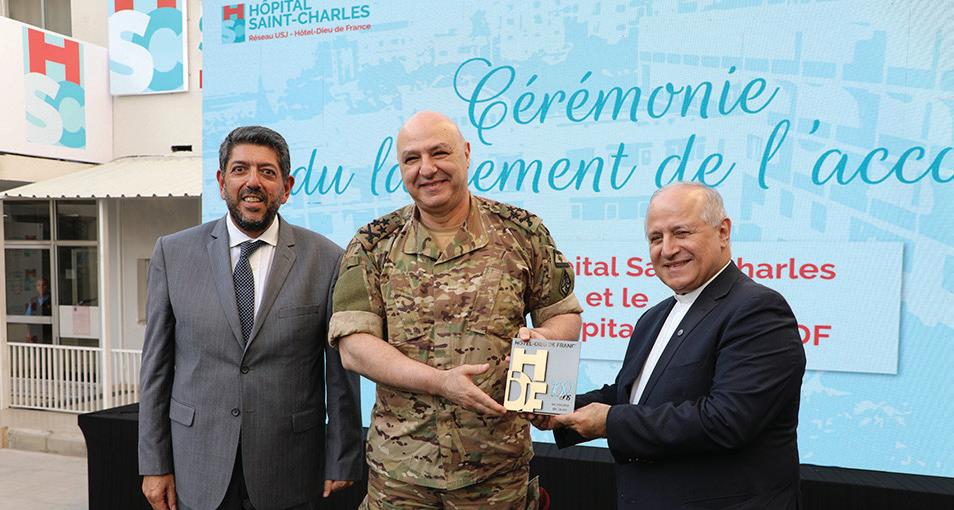
3 minute read
Saint-Charles Hospital joins USJ-HDF
Saint-Charles Hospital has joined the Saint-Joseph University-Hôtel-Dieu de France (USJ-HDF) Hospital Network in Lebanon. A ceremony to mark the agreement was held on June 27, at Saint-Charles Hospital, Fiyadieh, Beirut under the patronage of His Excellency the Minister of Public Health of Lebanon, Dr Firass Abiad, in the presence of General Joseph Aoun, Commander-in-Chief of the Lebanese Army, as well as civilians, politicians, senior military officers and representatives from Saint-Joseph University, Hôtel-Dieu de France and Saint-Charles Hospital.
Speaking at the ceremony, Mr. Nassib Nasr, the Director General of Hôtel-Dieu de France, said: “This partnership marks a significant step forward in our shared commitment to the health and well-being of the Lebanese population.
“We have a responsibility to meet the medical needs of all those who pass through our doors, whatever their origin, socio-economic status or resources,” he emphasized.
“Together, we continue to hold high the values of compassion, medical expertise and dedication to patients. May we find inspiration and strength in this alliance to build a better future for all.”
Commenting on the collaboration that is part of the such poor condition. Second, the social responsibility of Saint-Joseph University of Beirut and Hôtel-Dieu de France will be marked by a very critical period where we will support people and make it easier for them to have access to healthcare services.
Q: Is the healthcare sector still in decline today, or is it getting better?
NN: It is still declining, perhaps more slowly than before, and it will continue to decline until there is new governance in the country as well as a different political and economic situation, because they are closely related to what is happening outside the hospital. Indeed, Lebanon depends on public coverage, as 40% to 50% of the Lebanese population is covered by the army, the ISF, and the public social hospital network, the Rector of Saint-Joseph University of Beirut and Chairman of the Board of Directors of Hôtel-Dieu de France, Pr Salim Daccache s.j., stressed the importance of “working together to save the Lebanese hospital sector, but also and above all to save the quality and excellence of education, science and learning that have long distinguished Lebanon. A Lebanon where honesty and transparency in higher education were paramount. Today, we can see with our own eyes just how much the Lebanese human capital – that is, skilled and educated people – is working to save Lebanon, which is conspicuous by the absence of politicians and their inability to elect a new president for this resilient and obstinate republic.”
The Advisor to the Minister of Health, Dr Pierre Anhoury, congratulated the agreement, pointing out that “the development of the USJ-HDF network shows the extent to which the difficult situation we are going through is a source of initiatives that would never have seen the light of day just a few years ago”.
He concluded by saying: “You have opened up a new path that optimizes the supply of care for the greater good of patients and the population. We renew our confidence in you and our commitment to supporting your development.” security system. The latter, however, is gradually disappearing.
Q: Having been ranked 23rd in the world for healthcare efficiency in 2019, can Lebanon still be considered a country where healthcare services are top-tier today?
NN: The country’s situation is dire. I don’t think Lebanon has the same rank as before at the international level. However, our hospital and our hospital network are ranked, if not first, second in the country and in the region in terms of quality healthcare.
Q: Lebanon was known for its top healthcare services, with people all around the world coming there to receive top-notch care and treatments. Has the healthcare sec- tor witnessed a decline in people visiting to Lebanon to access such services because of the economic crisis?
NN: Yes, and it’s mostly because of a political issue with the surrounding countries, not just because of the economic crisis. Nowadays, no one from the Gulf countries or the surrounding areas is traveling to Lebanon for tourism. The same applies to medical care. People from the Gulf countries today do not travel to Lebanon for medical treatment, as they have better, higher-quality medical care. They are building their own hospitals, thus replacing Lebanon as a medical care hub, and in doing so, they are taking a lot of doctors and nurses from our country. So, yes, it is difficult to maintain something that is not maintainable.










